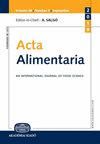The effect of nitrogen fertilisation on yield and quality of maize (Zea mays L.)
IF 1
4区 农林科学
Q4 FOOD SCIENCE & TECHNOLOGY
引用次数: 2
Abstract
Nitrogen (N) is one of the most essential nutrients affecting the yield and quality of maize (Zea mays L.). A field experiment was conducted at the experimental plot of the Department of Agronomy, The Hungarian University of Agriculture and Life Sciences, Hungary, to investigate the effect of nitrogen fertilisation on the yield and quality of maize. The experimental site included four observation plots with a net of 2 × 5 m size. Four N levels of T1, T2, T3, and T4 were sprayed at indicated plants in four replications according to treatment viz. 0, 50, 100, and 150 kg N ha−1. Nitrogen application in general does not significantly affect maize yield, its components, or grain quality. However, out of the four N treatments, the optimal N application between 50–100 kg N ha−1 potentially increased the yield, also the total expression of protein and starch contents in maize can be achieved with the right amount of N fertiliser, indicating that the treatment could produce a high grain yield as well as high protein and starch contents. Good N fertilising practice will boost the maize's nutritional value and make it more significant in the agriculture in the future. In addition, more research and assessment are essential to acquire the most benefit from the effect of optimal N application on maize yield and quality, and the findings could be beneficial to researchers and growers.氮肥对玉米产量和品质的影响
氮(N)是影响玉米产量和品质的最重要的营养物质之一。在匈牙利农业与生命科学大学农学系的试验区进行了田间试验,研究了氮肥对玉米产量和质量的影响。实验场地包括四个观测点,净面积为2 × 5. m大小。根据处理,在四个重复中,即0、50、100和150,在指定的植物上喷洒四种N水平的T1、T2、T3和T4 公斤 N ha−1。一般来说,施氮不会显著影响玉米产量、其成分或谷物质量。然而,在四个 N处理,最佳施氮量在50–100之间 公斤 N ha−1有可能提高产量,而且在适当的氮肥用量下,玉米中蛋白质和淀粉含量的总表达也可以实现,这表明该处理可以产生高产量以及高蛋白质和淀粉的含量。良好的氮肥施肥实践将提高玉米的营养价值,并使其在未来的农业中更加重要。此外,更多的研究和评估对于从最佳施氮对玉米产量和质量的影响中获得最大利益至关重要,这些发现可能对研究人员和种植者有益。
本文章由计算机程序翻译,如有差异,请以英文原文为准。
求助全文
约1分钟内获得全文
求助全文
来源期刊

Acta Alimentaria
农林科学-食品科技
CiteScore
1.80
自引率
0.00%
发文量
47
审稿时长
18-36 weeks
期刊介绍:
Acta Alimentaria publishes original papers and reviews on food science (physics, physical chemistry, chemistry, analysis, biology, microbiology, enzymology, engineering, instrumentation, automation and economics of foods, food production and food technology, food quality, post-harvest treatments, food safety and nutrition).
 求助内容:
求助内容: 应助结果提醒方式:
应助结果提醒方式:


